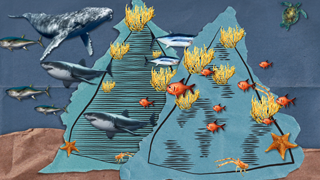Pew’s Biomedical Scholars Program Turns 35
A look at major milestones and scientific achievements
The Pew Charitable Trusts has supported groundbreaking research by early-career biomedical scientists working to improve human health for 35 years. Starting with the establishment of the Pew Scholars Program in the Biomedical Sciences in 1985, the portfolio has evolved into four robust grant programs that help researchers pursue some of science’s greatest challenges. Now more than 1,000 members strong, this network of scientists continues to conduct innovative research, mentor, inspire, and collaborate with one another.
Many Pew-supported scientists have been recognized for their contributions, including three Nobel Prize winners, five Lasker Award recipients, six MacArthur “Genius” Fellowship awardees, and 12 Presidential Early Career Awards for Scientists and Engineers recipients. Over the years, 28 researchers have been elected to the National Academy of Medicine and 42 to the National Academy of Sciences. To mark the 35th anniversary of the Pew scholars program, here’s a brief look at some milestones across the portfolio and a taste of the innovative work made possible along the way.
1985: Pew selects its first class of biomedical scholars
The Pew Scholars Program in the Biomedical Sciences awarded funding to its first class of 19 scientists in 1985. The following year, the program held its first annual meeting in Phoenix. It has brought together current members of the Pew scientific community every year since.
1991: Pew awards its first class of Latin American fellows
Early Pew scholars, all working in the United States, recognized the opportunity to expand their community and to support science beyond this country’s borders. In 1991, this led to the development of the Pew Latin American Fellows Program in the Biomedical Sciences, which has provided funding to talented scientists from Latin America to conduct two years of postdoctoral training in the United States. Following training, nearly 70 percent of fellows return to their home country with additional funding to establish their own labs and go on to publish studies, train other scientists, and hold leadership roles across academia and government.
1999: Pew biomedical scholar is recognized for revolutionizing chemical biology
Carolyn Bertozzi, a 1996 Pew biomedical scholar and faculty member at Stanford University, received a MacArthur “Genius” Fellowship in 1999 for her work in chemical biology. Bertozzi developed a method known as “click chemistry” that allows scientists to connect biomolecules in living cells, opening a new realm of possibilities for biomedical research.
2003, 2006, and 2009: Pew biomedical scholars win Nobel Prizes
The Nobel Prize rewards revolutionary work that paves the way for scientific advances across the globe. Three Pew-supported researchers have received the award to date.
Roderick MacKinnon, a 1992 Pew biomedical scholar at The Rockefeller University, was awarded the 2003 Nobel Prize in Chemistry with Peter Agre for determining the structure of a potassium ion channel, work that is critical for understanding how charged atoms flow in and out of cells and provide signals for nerve and muscle cells to function.
Craig Mello, a 1995 Pew biomedical scholar at the University of Massachusetts Medical School, and Andrew Fire received the 2006 Nobel Prize in Physiology or Medicine for their discovery of RNA interference—gene silencing by double-stranded RNA—which led to new methods of controlling the function of specific genes in both medical and lab settings.
Carol Greider, a 1990 Pew biomedical scholar at Johns Hopkins University, and researchers Elizabeth Blackburn and Jack Szostak were awarded the 2009 Nobel Prize in Physiology or Medicine for their discovery of the enzyme telomerase, providing new insights into chromosome stability with implications for a better understanding of cancer development and the aging process.
2014: The Pew-Stewart Scholars for Cancer Research Program launches
Pew partnered with the Alexander and Margaret Stewart Trust to launch the Pew-Stewart Scholars for Cancer Research Program in 2014 to support early-career scientists in uncovering treatments and cures for cancer. Selected from designated National Cancer Institute centers and leading research institutions, investigators are awarded grants annually to pursue research focused on better understanding cancer’s origins, diagnosis, and treatment.
2016: Pew biomedical scholar receives award for breakthrough studies on hepatitis C
Before Charles Rice, a 1986 Pew biomedical scholar and molecular virologist at The Rockefeller University, devised a system to replicate hepatitis C, the virus was notoriously difficult to study. Rice and researchers Ralf Bartenschlager and Michael Sofia received the 2016 Lasker-DeBakey Clinical Medical Research Award for engineering an efficient way to grow the virus in a lab environment. Their work helped scientists to ultimately develop a drug that eliminates infections in up to 90 percent of patients.
2017: Pew creates the Innovation Fund
As a vote of confidence in the power of collaborative, interdisciplinary research, Pew created the Innovation Fund in 2017 to encourage partnerships among alumni of Pew’s biomedical programs. Combining their unique areas of expertise, six pairs of researchers each year are selected as Innovation Fund Investigators. Over two years, they receive $200,000 to tackle complex questions in human biology and disease.
2019: Pew biomedical scholar is recognized for research on mechanisms underlying pain
In 1997, David Julius, a 1990 Pew biomedical scholar at the University of California, San Francisco, and fellow researchers discovered the capsaicin receptor, a protein that helps detect the chemicals in chili peppers that make them "hot.” His work has provided insight on how to treat pain associated with irritable bowel syndrome, arthritis, cancer, and more, earning him the 2020 Breakthrough Prize in Life Sciences in late 2019.
Kara Coleman directs The Pew Charitable Trusts’ biomedical programs, including the biomedical scholars, Pew-Stewart Scholars for Cancer Research, and Latin American fellows programs. Jennifer Villa is a senior associate supporting the programs.






